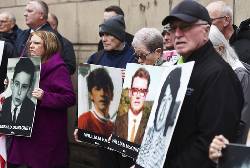LONDON (AP) — The only person ever charged in the infamous 1972 Bloody Sunday massacre in Northern Ireland where British soldiers opened fire on unarmed demonstrators went on trial Monday in a Belfast court with a prosecutor calling the shooting unjustified and its impact “long lasting and profound.”
The ex-paratrooper, a lance corporal identified only as “Soldier F” and concealed from view in court behind blue floor-to-ceiling curtain to protect him from vengeance, has pleaded not guilty to two counts of murder and five counts of attempted murder in what was the deadliest shooting in the three decades of Northern Ireland violence known as “The Troubles.” A total of 13 people were killed and 15 others were injured.
“The civilians ... did not pose a threat to the soldiers and nor could the soldiers have believed that they did," prosecutor Louis Mably said in Belfast Crown Court. “The civilians were unarmed and they were simply shot as they ran away.”
The Jan. 30, 1972, massacre in Londonderry, also known as Derry, has come to symbolize the long-running conflict between mainly Catholic supporters of a united Ireland and predominantly Protestant forces that wanted to remain part of the United Kingdom. Tensions have eased since the 1998 Good Friday peace accord, which created a system for Republican and Unionist parties to share power in Northern Ireland.
Families of the victims who have campaigned for more than a half century for accountability for the killings marched to the courthouse before the trial carrying photos of the dead and walking behind a banner reading “Towards Justice.”
John McKinney called it a momentous day.
“It has taken 53 years to get to this point, and we have battled all the odds to get here,” said McKinney, whose brother, William, was killed in the shooting.
“Everything that we have achieved to this point has been through relentless commitment and a refusal to lie down," he said. "We will shortly occupy a courtroom very proudly with our heads held high and in the knowledge that, regardless of the ultimate outcome, that we are on the right side of history."
From instigators to victims
The government initially said soldiers from a parachute regiment opened fire at gunmen and bombers who were attacking them. A formal inquiry cleared the troops of responsibility. A subsequent and lengthier review in 2010 reached a much different conclusion, finding that soldiers had fired at unarmed people fleeing and then lied about it for decades.
Then-Prime Minister David Cameron apologized and said the killings were “unjustified and unjustifiable."
The findings cleared the way for the eventual prosecution of Soldier F, though that, too, has been beset by delays and obstacles.
It took seven years from the time police opened their investigation until prosecutors announced in 2019 that they would only charge Soldier F. They said there wasn't enough evidence to charge 16 other former soldiers and two alleged members of the Official Irish Republican Army who were investigated for their roles in the shootings.
Two years later, the Public Prosecution Service dropped the case because they didn't think they could prevail at trial. They made the decision after a judge tossed out a case against two soldiers in the killing of an Irish Republican Army leader after ruling key prosecution evidence was inadmissible.
But family members of one the Bloody Sunday victims appealed and the case against Soldier F was reinstated.
Long wait for justice
Tony Doherty, whose father Patrick was one of those killed, said the campaign for justice that began in 1992 had three demands: a declaration of innocence for the dead and wounded, rejection of the initial inquiry’s conclusions and prosecution of those responsible.
“The first two demands have been met, and when a British soldier stands in the dock on Monday and faces charges of multiple murder and attempted murder, we will see the third demand met, although we will always believe there should be many more on trial for Bloody Sunday,″ Doherty said. “We have waited 53 long years for justice and, hopefully, we will see a measure of it through this trial.”
Soldier F is charged with two counts of murder in the deaths of James Wray and William McKinney, and five attempted murders for the shootings of Joseph Friel, Michael Quinn, Joe Mahon, Patrick O’Donnell and for opening fire at unarmed civilians.
A quarter century after the peace agreement, Bloody Sunday remains a source of tension in Northern Ireland.
In addition to families of victims demanding justice, supporters of army veterans who fought in the conflict complain they continue to be dogged by investigations and potential charges decades after their service ended.
Northern Ireland Veterans Commissioner David Johnstone said outside court it's important to remember the vast majority of nearly 300,000 British troops served with dignity and restraint and more than 1,000 lost their lives and thousands more were wounded in that tumultuous period.
“Many veterans today feel frustrated, feel angry, and indeed feel betrayed by the legacy process since 1998,” he said. “There must first be a fair and balanced legacy process, a process that does not facilitate the wholesale demonization of those who served and certainly not facilitate the rewriting of the history of the Troubles.”
...


 Copyright © 1996 - 2025 CoreComm Internet Services, Inc. All Rights Reserved. | View our
Copyright © 1996 - 2025 CoreComm Internet Services, Inc. All Rights Reserved. | View our